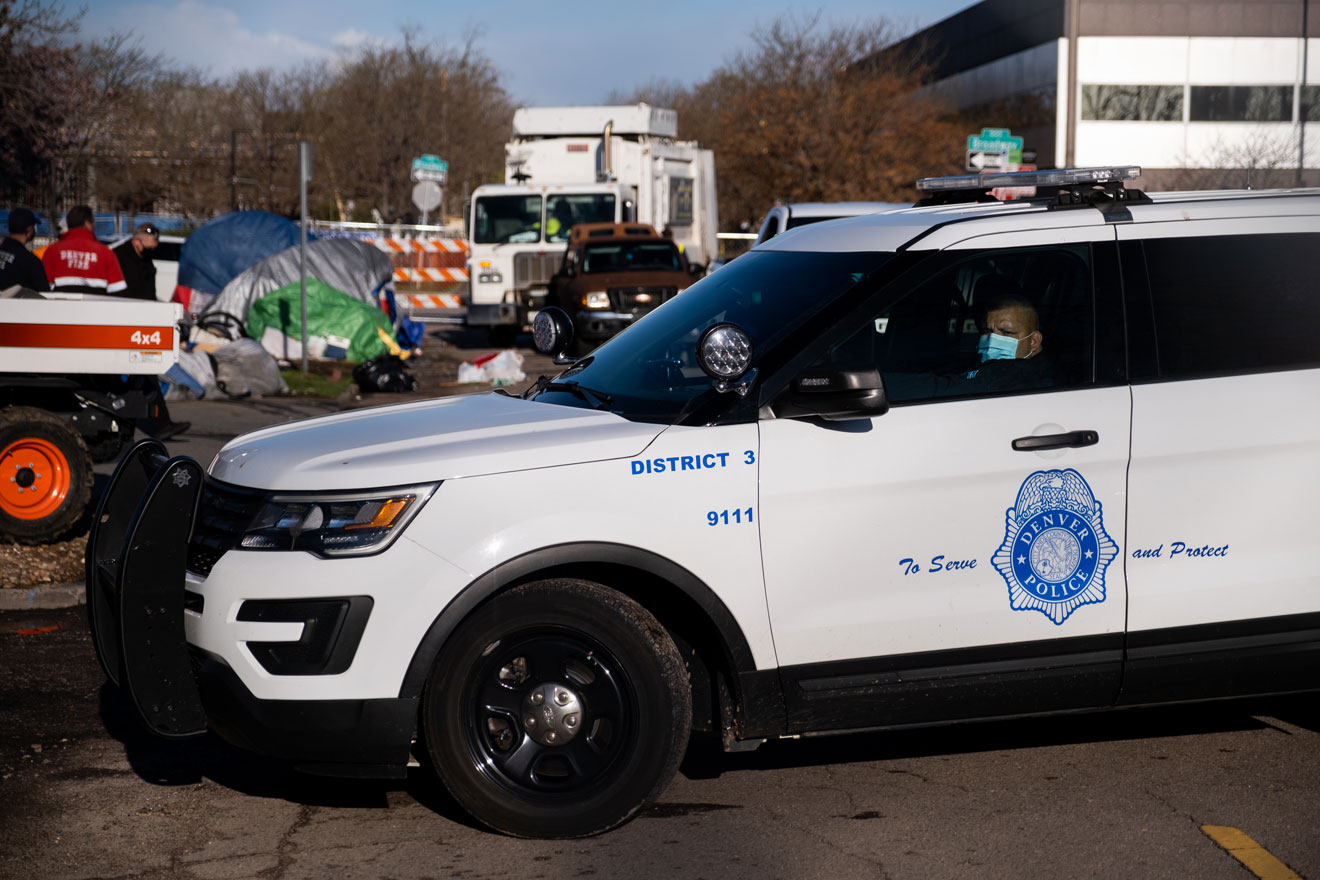
A police car at a sweep of a homeless encampment at Denver’s 4th Avenue and Broadway on May 5, 2021. Photos by Eli Imadali (except where noted)
A police car at a sweep of a homeless encampment at Denver’s 4th Avenue and Broadway on May 5, 2021. Photos by Eli Imadali (except where noted)
Sharon Barth was facing her third sweep in four months.
She’d been camping out next to a Dunkin’ Donuts parking lot at the corner of Broadway and 4th Ave. in Denver along with her sister and some friends. They’d tried to keep it neat by keeping their belongings off the sidewalk, and some of the neighbors in the houses nearby seemed friendly, stopping by occasionally with food.
But the notice had come a few days ago that the police would force them out on Wednesday, May 5, and it was now Tuesday afternoon. Barth was frantically sorting through piles to see what she could salvage, what she might sell and what she would leave behind.
“She’s taking it hard,” said William Good, who was standing nearby. Good had been camping in the same area. “How would you feel if someone told you, ‘You gotta leave your home’? It ain’t right.”
The group camping along this strip of land knew each other; they took turns watching each other’s things. “Now they’re calling me mom,” said Barth, who is 51 and has been homeless for most of her adult life. “It’s making me feel old.”
She took 60-year-old Good under her wing, as she tells it, when she found that he’d been beaten up; it seemed like he was always in danger of getting hurt. “But he listens to me,” she said.
Now, everything was in chaos. Barth’s sister, who had been staying in the tent next to hers, had disappeared the night before; nobody knew where.
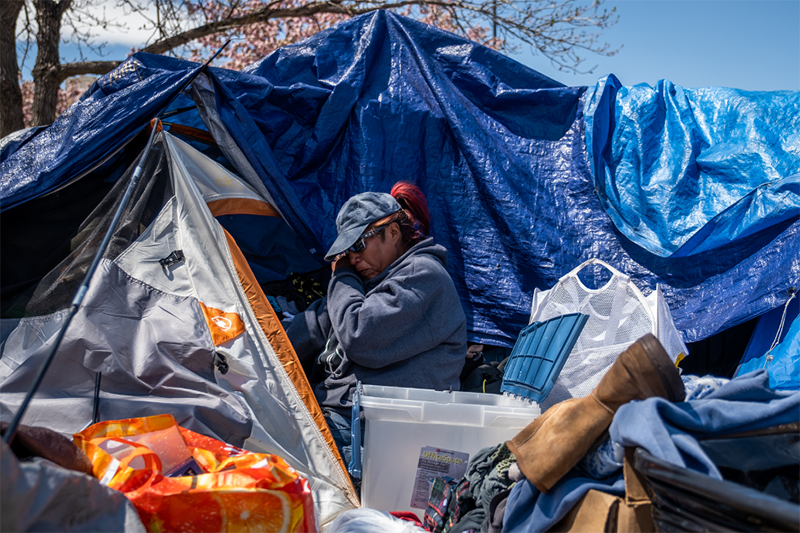
Sharon Barth organized her belongings on May 4, 2021, a day before a sweep of the camp where she was living.
“We don’t know where we’re going to go,” Barth said.
Homelessness has increased across the country since 2016, following years of decline. The rise has been fueled by the growing number of people living on the streets. And that was before the COVID-19 pandemic.
The city of Denver banned unauthorized camping in public places in 2012, forbidding people from making use of “any form of cover and protection from the elements other than clothing.” Voters in the city overwhelmingly rejected a 2019 ballot measure that would have overturned the camping ban.
But people never stopped camping, and the pandemic didn’t help. The economic fallout knocked people down who were already in precarious situations, and the eviction moratoriums had enough loopholes for people to fall through.
Already, a lot of people saw shelters as a last resort—Good said they’re dangerous, they’re dirty, they treat you badly, they separate you from your belongings and your loved ones.
In the early days of the pandemic, shelters consolidated services and shut down locations, reducing the availability of beds by more than half. At the same time, the easy spread of COVID-19 in crowded, indoor spaces provided another compelling reason to steer clear. Urban campers found strips of land wherever they could—alongside deserted parking lots emptied of commuters, under overpasses, in parks.
A precise count of people who are unsheltered is hard to come by. The last point-in-time count was conducted in January 2020, and found 996 people living on the streets in Denver. (Most of the 4,171 people categorized as experiencing homelessness were living in shelters, transitional housing or motel rooms.) This year’s count of people who are living outside has been delayed because of the pandemic, but most advocates and service providers believe the number has increased.
Since last year, the city has ramped up its efforts to put people up in hotels, and contracts with outreach workers to connect campers with permanent housing. The City of Denver also helped fund two sanctioned outdoor campsites that can accommodate a total of 100 people, hosted in private parking lots. By February 2021, shelters in Denver housed 60% more people per night than they had in the two weeks prior to the pandemic.
Sabrina Allie, a spokesperson for the city’s Department of Housing Stability, says the goal isn’t to get people into shelters—it’s to get people housed or prevent them from losing their homes to begin with. Her office focuses on connecting people to rental assistance, creating and preserving affordable housing, and helping people in crisis.
“What we know is that to end homelessness, we need to get people into housing and get them the supportive services they need,” said Allie.
But it hasn’t been enough. There are too many people without stable housing, and less and less housing that they can afford as the real estate market continues to soar.
Last year, Centers for Disease Control and Prevention guidelines recommended providing latrines, handwashing stations and sanitation services to camps rather than forcing people from their only shelter during the pandemic.
Instead, Denver stepped up its sweeps of unsanctioned encampments. Advocacy group Denver Homeless Out Loud counted 34 sweeps in 2020. In 2021, the pace has more than doubled, they said; the sweep on Broadway and 4th Ave on May 5 was the 34th so far this year. Spokespeople for the city said they didn’t have a count.
(Though they are widely referred to as sweeps—including by people displaced by them—city officials discourage use of this term, preferring “cleanups.”
“It’s important to note that the term ‘sweep’ literally means to clean by brushing away dirt or litter, which is not a way in which we would ever refer to people experiencing homelessness, so I hope it’s clear that the city does not use that terminology,” said Allie.)
Advocates for unsheltered Denverites say criminalizing homelessness is costly, unconstitutional and pointless. People displaced by the sweeps frequently depend on friends, service providers and routines that are tethered to a particular place; many of them move no more than a block or two away to create or join another campsite, settling into an uneasy rhythm until they are swept again. The camping ban has faced legal challenges since its inception.
Evan Dreyer, deputy chief of staff for the office of Denver Mayor Michael Hancock, said the health threats posed by the encampments—both to the people living in them and their neighbors—are too big to ignore. He cites examples of people who have died of exposure while living outdoors, and recent propane explosions at encampments, including one that killed a man living in his van.
“We do believe they are an unfortunate necessity,” said Dreyer of the sweeps. “Our approach always is, let’s do everything we can to try to get somebody to a better situation, a more stable and healthier situation than living unhoused on the streets.”
In October, Denver Homeless Out Loud sued the city to stop the sweeps during the pandemic. The case is still pending. In January, a federal judge issued an injunction that the lawyer representing the plaintiffs called a partial victory. Denver would have to provide seven days’ notice to people before displacing them; some people had previously been notified just hours in advance.
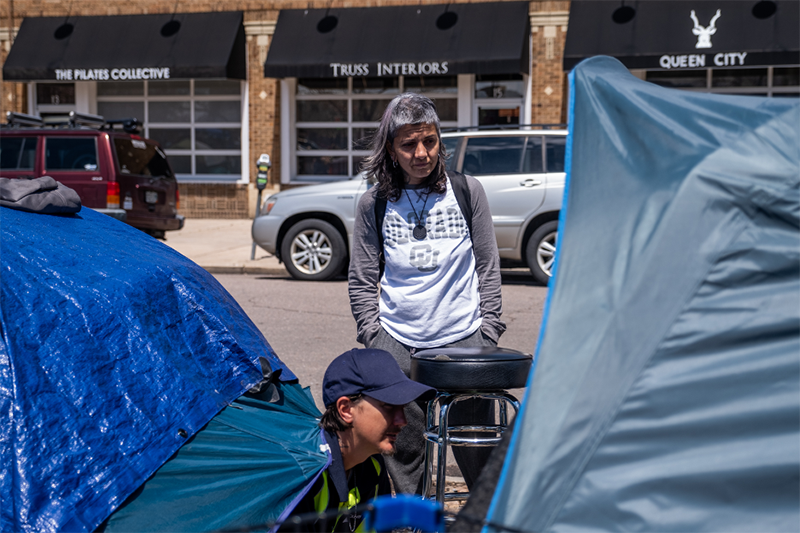
Ana Cornelius, center, of advocacy group Denver Homeless Out Loud, talked to people ahead of a sweep.
A few feet away from where Barth was frantically sorting her belongings, Ana Cornelius, who documents sweeps for Denver Homeless Out Loud, was talking to a group of men living in some neighboring tents. (Denver Homeless Out Loud receives funding from The Colorado Trust.)
Cornelius is among a group of people who show up to every sweep. She said she does it to make sure Denver is living up to its obligations under the injunction, and to raise awareness of the sweeps’ impact. She also shows up a day before, to make sure that people who are living in the camps know what’s going on, and what their rights are.
That day, Cornelius was trying to convince Chris Maynard, who is a veteran of the Iraq and Afghanistan wars, to push for housing through Veterans Affairs.
“Vets qualify for services that other people don’t,” Cornelius told Maynard. “Get what you can. You deserve it.”
But Maynard didn’t trust the VA, and he didn’t like what they’d offered the last time he made contact with them: a place with a shared bathroom and little privacy.
“I don’t play well with others,” said Maynard. “I could see that it wasn’t going to work out.”
Maynard is relatively new to living on the streets. For most of his life, he’s had enough money to live on. But things happened. He had a hard time processing the trauma of war. He watched four of his friends die in combat. He got divorced, had a mental breakdown, and spun into addiction.
Still, Maynard had managed to stay employed and housed until the pandemic hit, he said. Then the work he relied on dried up, and Maynard could no longer afford the $1,200 or $1,500 per month it costs to rent a studio apartment in Denver.
Maynard, Rick Hervey and Brent Laraway met each other at a methadone clinic, before they were living on the streets. Laraway is a veteran, too, though he wishes he weren’t. He wakes up screaming with night terrors, and Maynard is the one who knows how to calm him down.
Maynard said he wished there were some acknowledgement of the community that exists among people living unhoused on Denver streets.
“We all do rely on each another,” said Maynard. “People don’t understand that.”
The shelters and other housing programs are generally designed to take just one individual at a time, or families with kids.
“I’ve never understood that,” said Maynard. “Especially if there’s addiction. You need moral support.”
He also thinks the interventions should come earlier—before the point when people are living on the streets.
“I should have never been allowed to get in this situation,” said Maynard. When he was stationed in Europe with the military, he didn’t see people living on the streets—not nearly on the same scale as here. “We can waste money dropping expensive bombs on people. Why can’t we help people here?”
The three men were planning to be out of there before the police came. They had already scoped out a place a couple of blocks away.
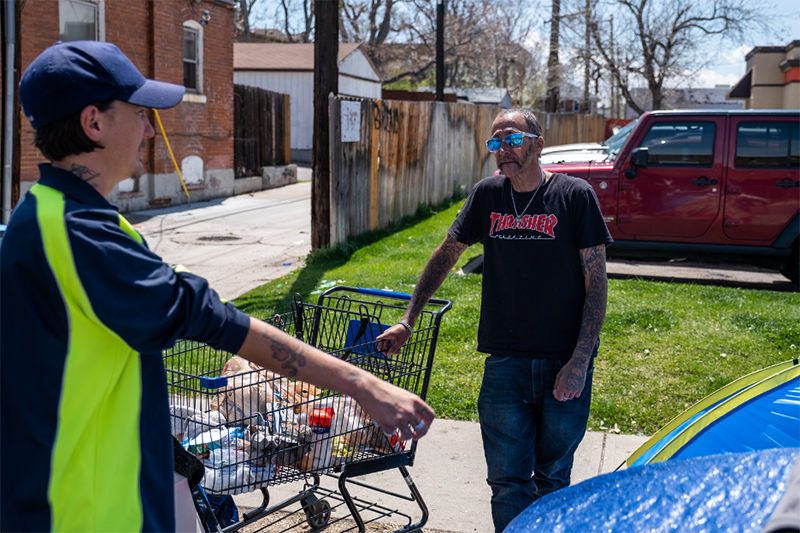
Brent Laraway, left, and Rick Hervey were planning to pack up and leave before their camp was swept on May 5.
Cornelius has herself been homeless twice. Both times came right after she experienced violence: sexual assault, domestic violence. The first time, as a teen, she lived outside, off and on, for a year.
“It was kind of like just wanting to disconnect from society,” said Cornelius. “I just didn’t want to be part of it anymore. It wasn’t offering me anything.”
The second time she was unhoused, years later, she had five young children. (They are now mostly grown; just the two youngest still live with her.) That time, she was connected to a program that provided her with temporary housing, a voucher and an additional subsidy, which she managed to save.
Surviving violence, or some other kind of trauma, is a common thread in the lives of many people who are living on the streets.
For Barth, it was domestic violence that resulted in her being homeless the first time, when she was 19. And many times after that. “All of my relationships have had domestic violence,” said Barth.
Homelessness piles on the trauma. Many people living on the streets have witnessed or experienced astonishing amounts of violence and aggression, including bias-motivated attacks against them.
The sweeps are traumatic, too. Barth had lost all of her belongings in a previous one. The police are supposed to put people’s things in storage when they take it away, but that’s not always how it works out. “I wish they’d just tell the truth, like, ‘We’re throwing it away,’” said Barth.
(The Denver Police Department didn’t respond to a specific request for comment on the disposition of people’s belongings during sweeps, and referred all other questions to the Department of Housing Stability.)
And yet the thing that outsiders seem to focus on is drugs and alcohol.
“What would you do [if you were unhoused]? Would you live a happy life?” said Barth. Drug and alcohol use are common in many American communities; it shouldn’t be a shock that they’re common here, too. “That’s what people do. It’s unfortunate, but that’s what people do.”
If the city really wanted to help, said Barth, they’d send therapists out to work with people living on the streets. Or help her get into permanent housing; Barth had a Section 8 voucher, and was on a waitlist.
Cornelius reminded Barth that the Denver City Council starts each meeting with a land acknowledgement—a few words pointing out that they stand on land stolen from Indigenous tribes.
And still Barth, who is Oglala Sioux, keeps being displaced. Indigenous people are overrepresented among unhoused Denverites, as they are across the country.
Barth was worried about tomorrow.
“I don’t like people coming up on me full force,” said Barth. It brought back her experiences with violence. “Nobody does.”
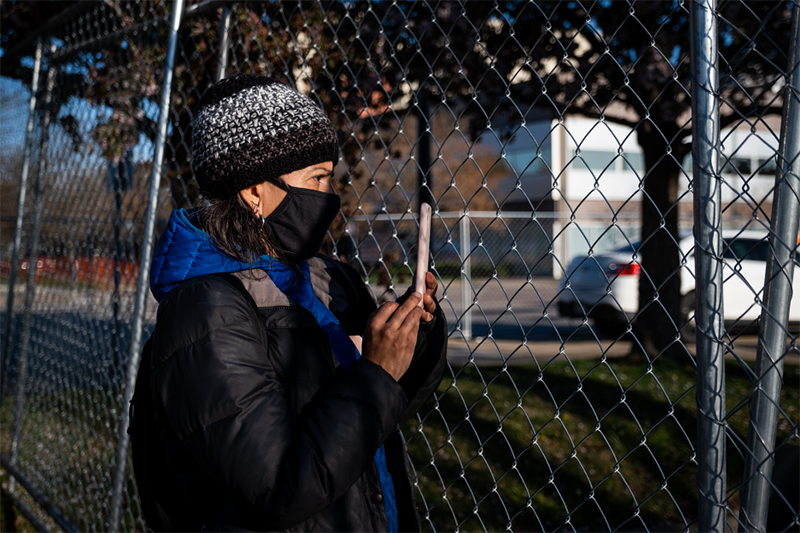
Cornelius documenting the cleanup on May 5.
By 6:15 on the morning of the sweep, the police had set up a perimeter fence around the camp. (“Because we’re animals, didn’t you know?” was a woman’s dry comment about being fenced in at a different sweep the day before.)
There were just three or four people still inside the tents. Maynard, Hervey and Laraway had already gone to the next camp, leaving behind a small, neat pile of discarded items.
Good was still there. So was Barth. She never did sell anything, so all her belongings were sitting in piles. She was inside the tent as machinery outside whirred. There was no sign of her sister.
Police cars parked, then moved, so it was hard to count them. There were four—no, six. A Bobcat forklift was idling. There was a hazardous materials truck, and police officers and yellow-vested sanitation workers within the perimeter.
The sweeps don’t show up on any line item in the city budget—there are too many departments involved. Efforts by media organizations and elected officials to compel the city to tally the cost have so far been unsuccessful.
People affiliated with From Allies to Abolitionists, a Denver-based advocacy group, submitted a records request under the Colorado Open Records Act to find out the cost of sweeps. They got an invoice for $6,000 to access the records, which are by law meant to be public, said John Staughton, who works with the group.
Unable to pay the full amount, they decided to conduct their own audit. Staughton shows up to every sweep, carefully tallying police cars, feet of perimeter fencing, heavy machinery and city employee hours. He estimates the cost of each sweep at $21,000—or more than $650,000 in total by the first week of May.
The Denver Post did its own estimate based on receipts to contractors, and came up with $400,000 for last year’s sweeps.
Dreyer, from the mayor’s office, said he wasn’t sure of the cost, but guessed the Post’s estimate was close. He’s aware of the argument that the money could be better spent on housing. But he said the cost of the cleanups is dwarfed by the city’s spending on preventing and resolving homelessness, including $80 million a year on affordable housing, supportive services and shelters through the Department of Housing Stability and other efforts.
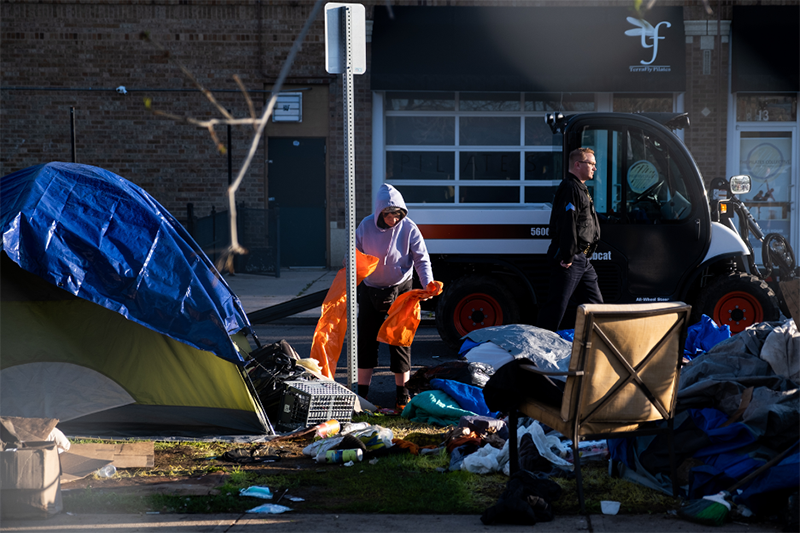
Eve Thompson packed up her things on May 5.
Inside the perimeter, Eve Thompson was sorting through her things. She slipped outside the fence to get some coffee and a sandwich from Kelsang Vyria, a Buddhist nun who shows up to all the sweeps with food and supplies.
Thompson was philosophical about the sweeps.
“It’s not that bad. It could be worse,” she said. They’re not allowed to camp on public lands, so police are just doing their jobs, she figured. “As long as you’re nice, they’re nice.”
What she’d like is for the city to set aside a large area where people are allowed to camp—with showers and toilets.
“People pee in the alleys. And then when it rains, it stinks of piss,” said Thompson. “Isn’t that a health hazard?”
Kelsang Vyria pointed out that housed people blame unhoused people for that.
“Well, where are we supposed to go?” said Thompson. Restaurants nearby won’t let them in the bathroom, even if they buy something, she said.
Thompson has been living on the streets for a while. There was a period during the summer of 2020, when people were camped out near the State Capitol, that she felt hopeful about what was happening in Denver.
Plenty of people at the time saw the large encampment in the center of the city as a rat-infested health hazard, an eye sore, and threat to the city. But it didn’t feel that way to Thompson.
“That was huge for the homeless community,” she said. Just months after Denver had rejected the right-to-survive ballot initiative, people had made themselves visible in the center of the city. “It’s like we were showing everybody, we can live together in peace.”
And then one man shot another man dead, hitting two others in a barrage of bullets. Thompson said the two men hadn’t even been living in the camp. But it didn’t matter. “We knew when it happened, it was all over,” said Thompson.
The shooting happened right in front of her. “I’m still messed up about it,” she said.
Thompson quit heroin six months ago, with the help of methadone. As soon as she can get her Medicaid coverage transferred to Nevada, she’s moving home to Las Vegas to be with her mother and her 10-year-old.
She’d already thought about how she’d describe this time, when it’s over: “It’s like a hippie commune. That’s what I’ll tell my daughter,” said Thompson.
“I can’t wait to go home,” she added.
Tonight, she was planning to camp near the Walgreens parking lot two blocks away.
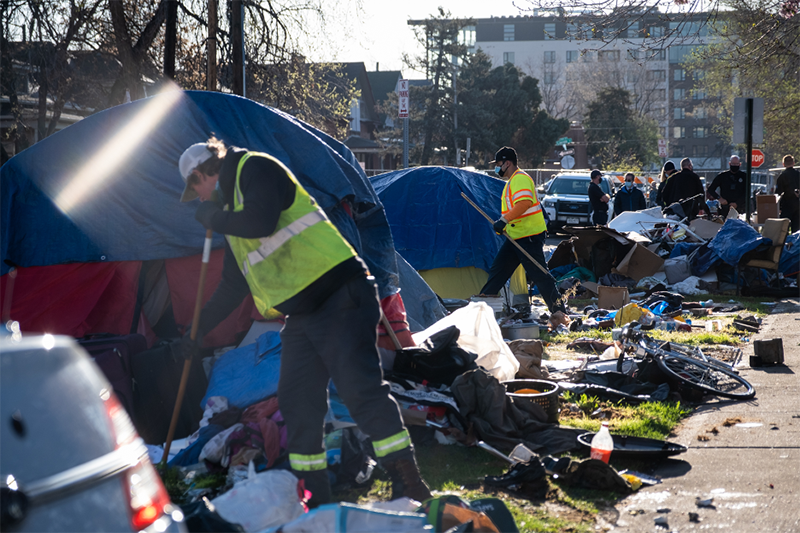
Workers removing trash during the May 5 sweep.
Cornelius has heard the complaints about encampments. They are the same ones that people living in them have, she said.
“We can all agree that people shouldn’t have to live in tents,” said Cornelius. “People shouldn’t have to poop outside. You shouldn’t have to step in poop while walking to your house. We agree that we should not have to step on needles. People should not be harassed or assaulted at their homes. If we agree that we have the same issue, how do we actually fix that?”
Until people have access to stable housing—without conditions—these camps will continue to exist, she said.
She advocates for parameters around what is acceptable. Smaller camps are easier to manage, she said. Cities could work with mutual aid groups and community organizations to provide port-a-potties, hand-washing stations and showers. The camps could be added to the city’s regular trash pickup schedule.
Cornelius has had a contentious relationship with the police at times. Her role is as a watchdog; she calls her organization’s attorney if the sweeps start earlier than they are supposed to, or if they otherwise don’t adhere to the recent court order or a previous settlement.
Cornelius has also been arrested for her work. She was at that moment facing the possibility of 300 days in prison for a park curfew violation, related to a vigil at the Capitol intended to raise awareness of the disproportionate number of people of color who are experiencing homelessness. She’d been offered a plea deal: three months’ deferred judgement and 12 hours of community service.
“They want to take me out for the protest season,” she said.
But at the sweeps, Cornelius said she has been trying to model what cooperation between community organizations and the city might look like. She has developed a working relationship with the police officers, including the ones that work with the department’s homeless outreach team. She knows the officers and sanitation workers by name: This one’s kind; that one’s aggressive; this one has gotten mean as his workload has increased.
During the sweep on 4th and Broadway, one of the officers approached the fence to ask if anyone knew where a person could buy a cheap truck to use for scrapping junk. Nobody did.
Another officer asked for help clearing out a particularly gross tent. It was filled with rotten food, he said. Three volunteers donned gloves and start clearing it out.
It’s typical, said Cornelius, for the volunteers who show up to get called inside the fence to do some of the dirtiest jobs—disposing of needles, for instance—despite the presence of hazardous materials workers.
Kelsang Vyria, the nun, had set up a pop-up tent at the same encampment several weeks earlier. Inside was a lined bucket, to use as a toilet. She was called over to empty it out, which she did.
Dreyer, from the mayor’s office, said the city makes efforts to connect people to services both in the lead-up to the sweeps and during the events themselves.
During the sweep, Barth got an offer. She could go to an emergency shelter, where she would be connected with a hotel room for a year, while she waited for more permanent housing.
Could this be a path to stable housing?
Barth wasn’t sure. She couldn’t afford to lose all her belongings again, and didn’t trust the police to put them in storage, like they were promising. And then what about Good? The shelter and the motel room were only for women. “Men need places to go, too,” she said.
As the last of the camp’s detritus was loaded into garbage trucks, Barth still didn’t know where she was going to go.
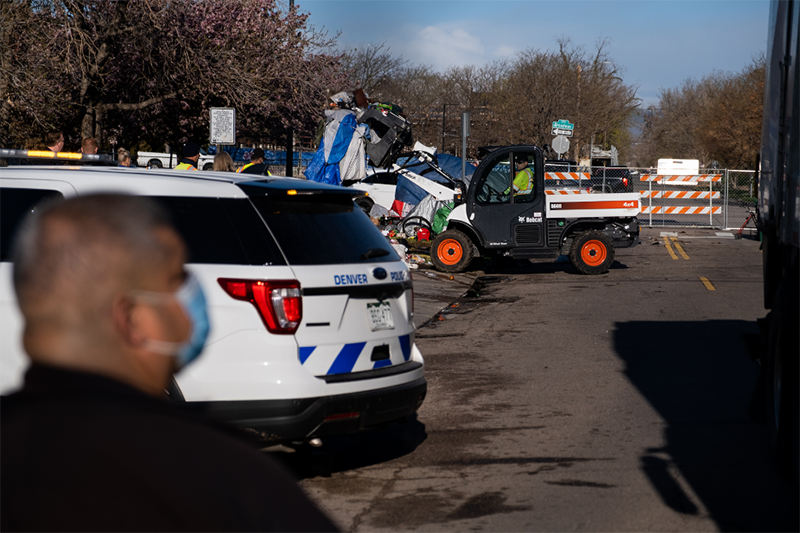
A forklift was used to remove tents, trash and other items left by people who told to leave their camp.
“This went well,” said Cornelius, after the sweep was done. “It doesn’t always go this well.”
She credited a mix of advocacy, the work of developing relationships with the police officers, and luck. Because of where the camp was, and where the perimeter fence was placed, the advocates had a good view of what was happening.
On a sweep the following day, the perimeter fence was placed so far away from the camp that Cornelius and others had to look down on it from a highway overpass to get a good view.
The advance notice helped, too; Maynard and his friends had been able to secure their property and move themselves out before the police arrived.
Cornelius gives credit to the city workers, including police, who go out of their way to find housing for the most vulnerable person in each camp. But her organization’s overall goal is to end the criminalization of homelessness.
“The only way homelessness will end is by providing people with homes,” said Cornelius.
“I’d like to see some flexibility in what housing means,” she added. “There are a lot of ways that human beings live throughout the world and all of these options should be on the table. Co-housing, tiny homes—these are really cost effective. Many people prefer those types of living situations.”
She dismisses the idea that providing people with stable housing is too expensive. The city has resources, she said, including the estimated $40 million to be raised from a sales tax passed by Denver voters in November for the purpose of addressing homelessness.
“I think if we try to be a little more intentional and a little more inclusive, we will find that we have all the resources and ability to do this now,” said Cornelius. “We just have to shift our priorities. And I guess that would be my question. What is our priority? Is it profit? Is it people? Is it taking care of one another? Is it fighting over resources? What is our goal?”
Current efforts to house people—inadequate as they may be—face stiff headwinds from people who have housing. The day after Barth and the others were swept from their homes, a group of neighbors in tony Park Hill sued to prevent a church from installing a city-approved outdoor camp in its parking lot for six months. (The lawsuit was dismissed.)
Another group of people was working to undo a recent move by Denver City Council to allow as many as five unrelated adults to share a home, up from the previous limit of two. Their petition won enough signatures to make it onto the November ballot.
That Friday, Cornelius joined a meeting of the Denver Basic Income Project. The pilot project is an experiment in recognizing the autonomy of people who are unhoused, by giving them monthly income—no strings attached. Previous basic income experiments around the world have resulted in payoffs in the form of health, happiness and stability.
Cornelius and others involved were crafting a message to the many people without shelter who had reached out to inquire about participating in the program. A lot of people would be turned away, Cornelius pointed out. They needed to be clear about that.
Despite everything, Cornelius has hope that the work of organizing and building stronger ties among the community of people who experience homelessness and their allies can help turn things around.
“It’s these community organizations that are the ones that are bridging gaps that capitalism conveniently has,” Cornelius said. The protest movements of the pandemic—for racial equity, and for defunding the police—have goals that can only be achieved if communities step up, she said. “The more inclusive we can be, the better chance we have at actually achieving that.”
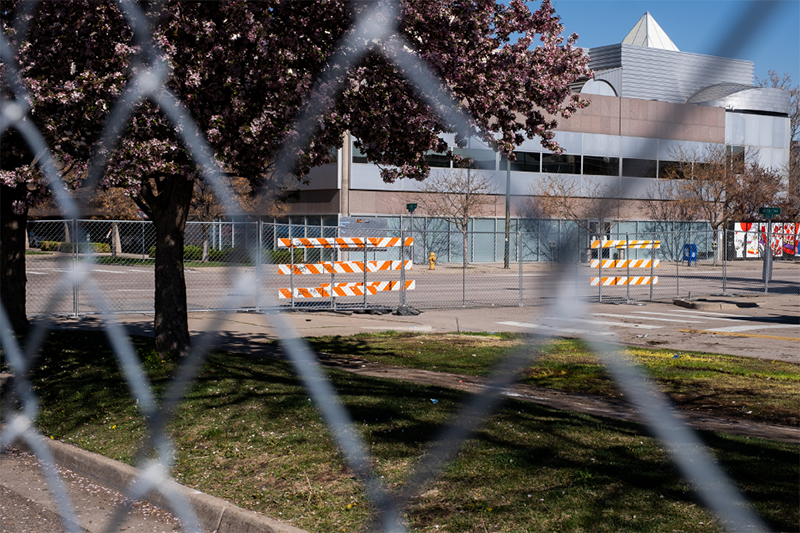
The small strip of land outside a Dunkin’ Donuts parking lot where Barth and others had been camping was empty after police and sanitation workers finished sweeping it.
Cornelius took the plea deal. She had promised her kids she wouldn’t go to jail.
Two weeks later, she heard an update about Sharon Barth.
Barth had never gone to the shelter, or the hotel room. Instead, she was at Broadway and 2nd Ave., at a larger encampment than the one she’d left. Several others she knew were there, too, including her sister, across the street, and Thompson. Laraway was there as well, said Barth.
On another rainy day in a month of rain, Barth was trying to stay dry in her tent. She said she had decided to hold out for an apartment through Section 8.
“I think that would be better,” said Barth. She said that, in the end, she felt some ambivalence about leaving her community. “I want to be off the streets. But at the same time, this is my family, and I can’t just leave them.”
She wanted Good to get off the streets, too. A few days after that last sweep, he’d been hit by a car. Barth was annoyed with him at the moment, but “he’s still my best friend.”
In the meantime, she had thoughts for Mayor Hancock—about how to get people into housing, how to get people the medicine and care they need, how to stop the encampments from turning into health hazards.
“I want to talk to him,” she said. “Why doesn’t he come and talk to us?”
She’d made a sign in neat, flowery letters on a piece of cardboard:
Please help, need financial assistance to be able to buy Pampers and a Goat Because the Mayor won’t let us Have Toilets or Trash Cans & Everyone Wants to Blame Us!!?? Thank you & God Bless
(Asked to respond, Dreyer said his office was working with service providers to find a temporary housing arrangement to accommodate both Barth and Good while she waited for an apartment to become available.)
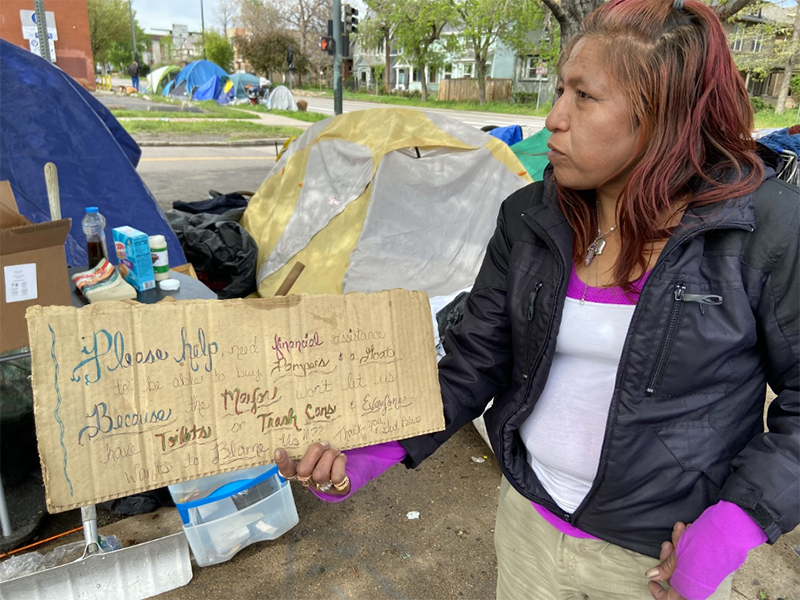
Barth outside of her tent at Broadway and 2nd Ave., on May 18, 2021, 13 days after the sweep two blocks away. Photo by Kristin Jones
Nearby, in Aurora, Mayor Mike Coffman was preparing to propose a camping ban in his city, too.
And Barth was getting ready to pack her things again. Her new camp was set to be swept in two days.
Correction: An earlier version of this story misspelled Kelsang Vyria’s name.